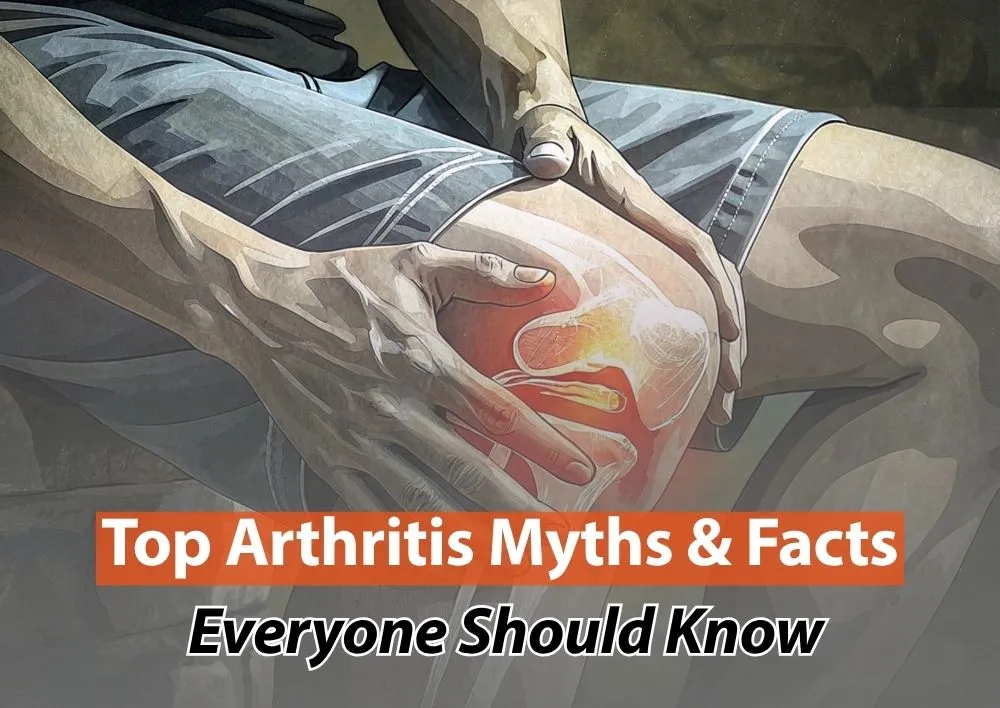Top Arthritis Myths and Facts Everyone Should Know
Summary
Arthritis is one of the most common health conditions worldwide, affecting millions of people across all age groups. Despite its prevalence, there are countless myths and misconceptions surrounding this condition that often lead to confusion and delay in proper treatment. Many people assume arthritis is only related to aging or that it always causes severe pain, which is not entirely true. Understanding the real facts is important for managing arthritis symptoms effectively, improving mobility, and maintaining an active, healthy lifestyle. By learning the truth, you can make informed choices about your diet, exercise, and treatment options, ensuring that arthritis does not limit your day-to-day activities. In this article, we will debunk some of the most common arthritis myths, providing clear insights and actionable advice to help you take control of your joint health.
Myth 1: Arthritis Only Affects Older People
Fact: While it is true that arthritis is more common among older adults, it is not exclusively an age-related condition. Arthritis can affect individuals of any age, including children and young adults. Juvenile arthritis is a condition that affects children under the age of 16 and can cause joint pain, swelling, and stiffness. Early diagnosis and treatment are important to prevent long-term joint damage and improve the child’s mobility and quality of life. Even young adults can develop arthritis due to injuries, genetic factors, or autoimmune conditions like rheumatoid arthritis.
According to Dr. Sumit Anand, the best orthopedic surgeon in gurgaon at Miracles Apollo Cradle/Spectra, “Arthritis is not just an ‘old-age problem.’ Early recognition and proper treatment, even in children and young adults, can significantly improve joint health and prevent long-term complications. Regular check-ups and awareness are key to managing this condition effectively.”
Myth 2: Cold Weather Causes Arthritis
Fact: Many people believe that cold or damp weather directly causes arthritis, but this is not accurate. Arthritis develops due to joint inflammation or degeneration, not because of temperature. However, changes in weather, especially cold or humid conditions, can make joint pain and stiffness feel worse for those who already have arthritis. Staying active, wearing warm clothing, using heated pads, and performing gentle stretching or low-impact exercises can help reduce discomfort during colder months.
Myth 3: Exercise Worsens Arthritis
Fact: A common misconception is that moving stiff joints will worsen arthritis, but inactivity can actually make symptoms more severe. Regular, low-impact exercises such as swimming, walking, yoga, and cycling help maintain joint flexibility, strengthen the surrounding muscles, and reduce overall pain. Exercise also improves circulation and supports weight management, which reduces stress on the joints. Consulting a physical therapist or an arthritis specialist can help design a safe and effective exercise routine tailored to your condition.
Myth 4: Arthritis Is Just Wear and Tear
Fact: While osteoarthritis is associated with the natural wear and tear of joints over time, not all arthritis is caused by degeneration. Rheumatoid arthritis, for example, is an autoimmune disorder in which the body’s immune system attacks healthy joint tissue, leading to inflammation, pain, and joint damage. Understanding the type of arthritis you have is important for choosing the right treatment, whether it’s medication, lifestyle changes, or other therapies. Early detection can significantly slow disease progression and improve quality of life.
Myth 5: Surgery Is the Only Solution
Fact: Surgery is usually perceived as the only way to relieve arthritis pain, but this is far from true. Most people manage arthritis effectively with a combination of medications, physiotherapy, lifestyle adjustments, and natural remedies. Surgery is typically considered only when these methods fail to relieve pain or restore mobility. Options like joint injections, minimally invasive procedures, and guided rehabilitation programs can often help avoid major surgery while providing significant symptom relief.
Myth 6: Diet Doesn’t Affect Arthritis
Fact: Nutrition plays a major role in controlling inflammation and supporting joint health. A diet rich in anti-inflammatory foods such as fatty fish, leafy green vegetables, nuts, olive oil, and berries can help reduce arthritis symptoms. On the other hand, processed foods, excessive sugar, and trans fats can worsen inflammation and joint pain. Maintaining a healthy weight through a balanced diet also reduces stress on weight-bearing joints, particularly the knees and hips.
Myth 7: Pain Means Arthritis Is Getting Worse
Fact: Arthritis pain is not always a sign that the condition is worsening. Pain levels can fluctuate depending on various factors, including activity, weather, stress, and fatigue. Temporary increases in pain may simply reflect daily activities or lifestyle factors rather than disease progression. However, persistent or worsening pain, swelling, or stiffness should be assessed by a doctor, as it may indicate an underlying flare-up or the need to adjust treatment. Tracking symptoms and maintaining regular check-ups with an arthritis specialist can help manage the condition effectively.
Tips For Arthritis Management
-
Maintain a healthy weight to reduce joint stress.
-
Stay active with low-impact exercises.
-
Follow a balanced, anti-inflammatory diet.
-
Monitor symptoms and consult an orthopedist near you regularly.
-
Use assistive devices if needed to support daily activities.
Conclusion:
Arthritis doesn’t have to control your life. By separating myths from facts, you can take proactive steps to manage symptoms, improve mobility, and enhance your quality of life. Knowledge is your first step toward better joint health.
Are you experiencing joint pain or stiffness? Don’t wait for it to worsen. Consult an arthritis specialist near you at Miracles Healthcare to get personalized treatment and guidance today!
Frequently Asked Questions
As per the WHO, Arthritis affects over 350 million people worldwide and includes more than 100 types, like osteoarthritis and rheumatoid arthritis.
Avoid excessive sugar, processed foods, trans fats, and overstraining joints, as they can worsen inflammation and pain.
Low-impact exercises, an anti-inflammatory diet, physical therapy, and proper medical care help relieve arthritis pain.
Older adults are most affected, but young adults and children can also develop arthritis, including juvenile arthritis.
Inflammation in the joints causes swelling, stiffness, and reduced mobility, resulting in persistent pain.
Regular movement and targeted exercises strengthen muscles, improve joint flexibility, and enhance overall mobility.














Was the information useful?
0 0